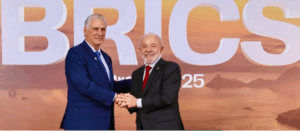 Havana, Cuba.- Brazilian President Luiz Inácio Lula da Silva, host of the XVII BRICS Summit, warmly greeted his Cuban counterpart, Miguel Díaz-Canel, this Sunday in Rio de Janeiro with an embrace and a firm handshake.
Havana, Cuba.- Brazilian President Luiz Inácio Lula da Silva, host of the XVII BRICS Summit, warmly greeted his Cuban counterpart, Miguel Díaz-Canel, this Sunday in Rio de Janeiro with an embrace and a firm handshake.
This was the afternoon session of the forum’s opening, held for the first time on South American soil with the participation of the bloc’s five founding members and 15 other countries, including nine as partners that expand the boundaries of the Global South.
Cuba is among the latter, prominent in its resilience, tested daily under the longest blockade in history, imposed by various US administrations for more than 60 years.
For many at Rio’s Museum of Modern Art, Lula’s gesture was not a simple greeting, but a political statement, dating back to the years when he shared the stage with the historic leader of the Cuban Revolution, Fidel Castro (1926-2016), in Porto Alegre or at the meetings of the Sao Paulo Forum.
The founder of the ruling Workers’ Party has seen Cuba not only as a symbol of firmness, but also as an unavoidable voice for the Caribbean and Latin America in multilateral forums. Without speaking, Lula’s greeting suggested that Cuba, a victim of an unjust blockade for more than six decades, is here, standing, speaking for many peoples.
Analysts believe that inviting the island to this summit was an act of diplomatic sovereignty, but also a vindication of regional integration.
Cuba, beyond its internal challenges, remains the most influential political force in the insular Caribbean, with a history of international solidarity that has earned it respect in Africa, Asia, and Latin America.
While the great powers of the BRICS—Brazil, Russia, India, China, and South Africa—discuss alternative currencies, energy transitions, and new global balances, Cuba’s presence serves as a reminder that the geopolitics of the South is also written with insular and Caribbean accents.
And in line with Lula’s gesture, the Final Declaration of the BRICS countries condemned the use of measures (trade sanctions and unilateral tariff increases) as political instruments.
However, the text did not directly mention the United States or the Donald Trump administration.
According to the document, the imposition of unilateral coercive measures is contrary to international law.
The BRICS rejects these measures, such as unilateral and secondary economic sanctions, which “have profound negative implications for human rights, including the right to development, health, and food security of the general population of the affected states.”